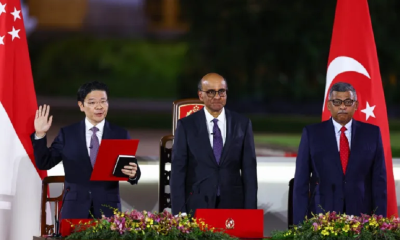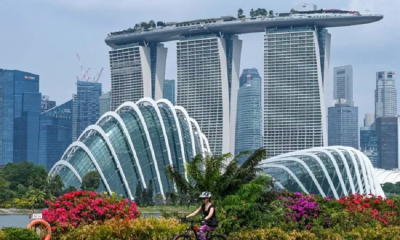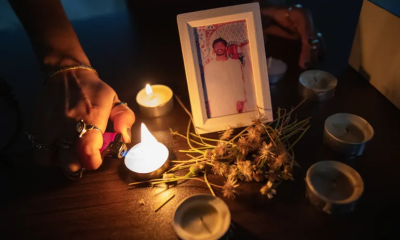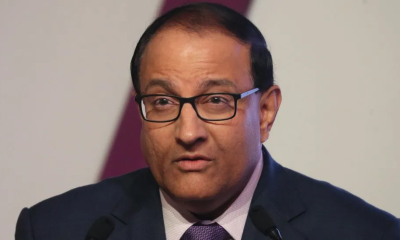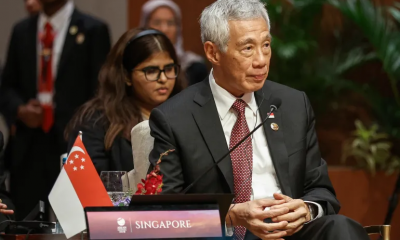Foreign News
Singapore tightens rules for expat workers with an eye on local discontent

Singapore – One of the world’s most open economies is attempting a delicate balancing act.
On the one hand, the Southeast Asian city-state wants to lure the world’s best and brightest to bolster its workforce, one of Asia’s most diverse. On the other hand, it has to assure locals competing with foreigners for jobs that the system works for them, too, nipping potential resentment or xenophobia in the bud.
From next year, the government will tweak that calculus in favour of locals by raising the salary threshold for foreigners seeking approval to work in the city-state.
Last month, Singapore’s Ministry of Manpower announced that new applicants for the Employment Pass (EP) system will have to earn at least 5,600 Singapore dollars ($4,140) per month, up from 5,000 Singapore dollars ($3,700).
Applicants working in the financial services sector will have to earn at least 6,200 Singapore dollars ($4,600), compared with 5,500 Singapore dollars ($4,100) at present.
“By regularly updating the qualifying salaries based on the set wage benchmarks, we ensure a level-playing field for locals,” Manpower Minister Tan See Leng told parliament during a budget debate.
Analysts said the changes were not surprising for a government that has regularly tweaked the rules for expat workers, most recently in September 2022, when it raised the salary threshold by 500 Singapore dollars ($370).
Walter Theseira, an associate professor and labour economist at the Singapore University for Social Sciences (SUSS), said the move had been “telegraphed for a number of years”.
Theseira said that while the EP system was originally intended to import highly-skilled workers to fill gaps in the workforce, “the criteria seemed to have expanded and EP holders became more prevalent in the middle of the market as well”.
“This was perceived by local workers to be unwelcome competition for jobs that many skilled locals could do, so the government responded by re-calibrating the EP again upwards, so that based on salaries, it now targets more clearly the high-end,” he said.
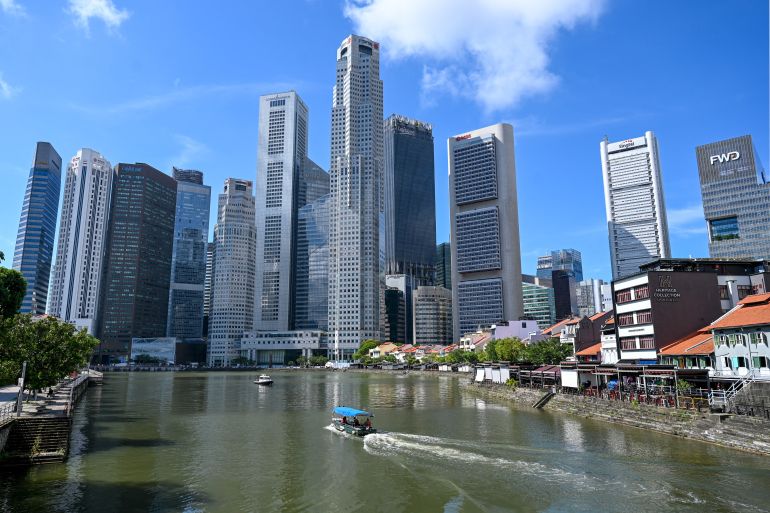
Singapore has built its reputation on attracting foreign talent (Aljazeera)
For decades, Singapore, an island with no natural resources that is about the size of New York City, has built its reputation on an openness to foreign talent.
The number of EP holders has grown substantially over the years, fuelled in part by anxiety over the country’s rock-bottom birthrate and greying population.
As of December last year, there were about 205,400 EP holders in the city, up from 161,700 during the same month in 2021.
As far back as 2021, Tan acknowledged that Singaporeans, though recognising the need to attract foreign talent, had concerns that the influx came at the “expense” of local businesses.
A labour market report released by the Manpower Ministry last month showed that employment growth in 2023, comprising 88,400 positions in Singapore – excluding migrant domestic workers – was largely made up of foreigners.
The revision of the EP qualification criteria can be seen as “a strategic move” to appease age-old tensions over hiring foreign talent amid a crowded job market, said Joshua Yim, the CEO of Achieve Group, a talent acquisition consultancy.
The changes also come as the Southeast Asian country is gearing up for one of the most politically significant transitions in its history.
Singapore’s ruling People’s Action Party is set to fight the next general election, due by 2025, under new leadership as incumbent Prime Minister Lee Hsien Loong prepares to step down after some two decades in office.
The issue of foreign workers became salient in the 2011 general election, when public discontent simmered over rising competition for jobs and increasing pressure on public infrastructure.
While most Singaporeans and permanent residents agree that immigration is generally good for the economy, slightly more than half also believe that immigrants take jobs away from locals, according to a 2021 survey by the Institute of Policy Studies.
In another survey conducted by the research firm Milieu Insight, Singaporeans were almost evenly divided on whether the nation struck the right balance between bringing in foreign workers and protecting local jobs.
Sid Suhas, the senior vice president and head of EMEA & APAC at the talent acquisition firm Cielo, said the visa changes are likely to prompt large employers to “focus more on attracting, developing and nurturing the local talent pool, particularly for junior professional and mid-level lower-skilled roles.”
With the higher salary threshold, companies are likely to adopt “a skills-first approach” when employing foreigners, Suhas said, focusing on talent in areas such as AI, technology, engineering and healthcare.
“The trend of limiting foreign talent deployment to specific skills and industries is inevitable. In the past, foreign talent had the opportunity to develop their careers in Singapore across various roles but now, the focus will likely be on senior and niche positions,” Suhas told Al Jazeera.
Suhas said he has already seen companies exploring alternative locations in the Association of Southeast Asian Nations (ASEAN) such as Thailand, Malaysia and Indonesia, as a means of relocating key talent while still maintaining proximity to Singapore.
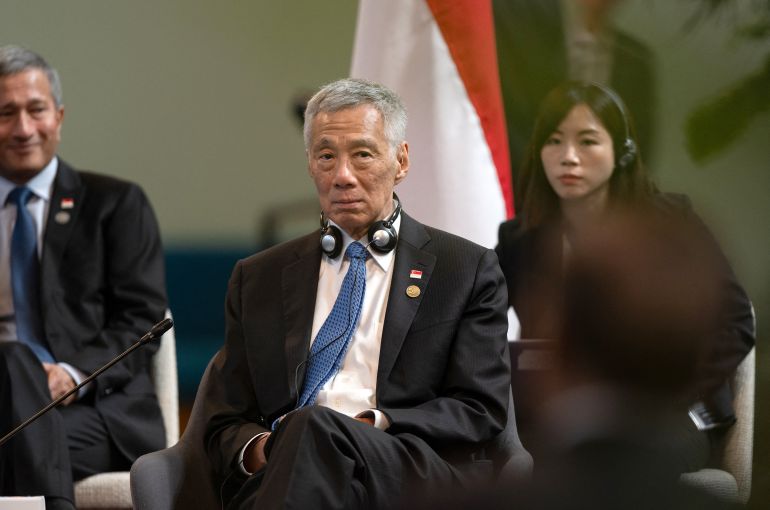
Singapore’s Prime Minister Lee Hsien Loong is due to step down before the 2025 general elections (Aljazeera)
“Most SMEs [small to medium-sized enterprises] do not rely much on EP workforce as their core talent pool,” Yuit told Al Jazeera.
“Selected businesses may have EP hiring in the stated 5,000 or 5,500 [Singapore dollars] range for specialised roles but usually, that is for time-limited, project engagement or if they are in specialised sectors that rely on a foreign talent pool because of a lack of matching local workforce.”
But the increased labour costs could affect the profitability of SMEs with tighter budget constraints, said Achieve Group’s Yim.
“Local SMEs may not be so well-oiled in terms of their processes and operations, as compared to the MNCs,” Yim said.
“They will feel the heat because they have to go up against the big players with the financial muscles who can offer higher EP salaries and attract better-quality talent. They might feel that talent is being stolen away and thus, this group is at the shorter end of the stick.”
Xu Le, a lecturer from the department of strategy and policy at the National University of Singapore’s Business School, said the policy change could “spur local companies to think out of the box and explore alternative methods to enhance overall operational efficiency and labour productivity”, in turn benefitting the economy.
Beatrice Liu-Cheng, the CEO of Oriental Remedies Group, said that while the higher-qualification threshold could pose challenges for her chain of Chinese medicine clinics, it would also be an “opportunity to further enhance the diversity and expertise” within its workforce.
Liu-Cheng said the changes would encourage her to seek out and nurture Singaporean talent through training programmes, mentorship initiatives and partnerships with educational institutions.
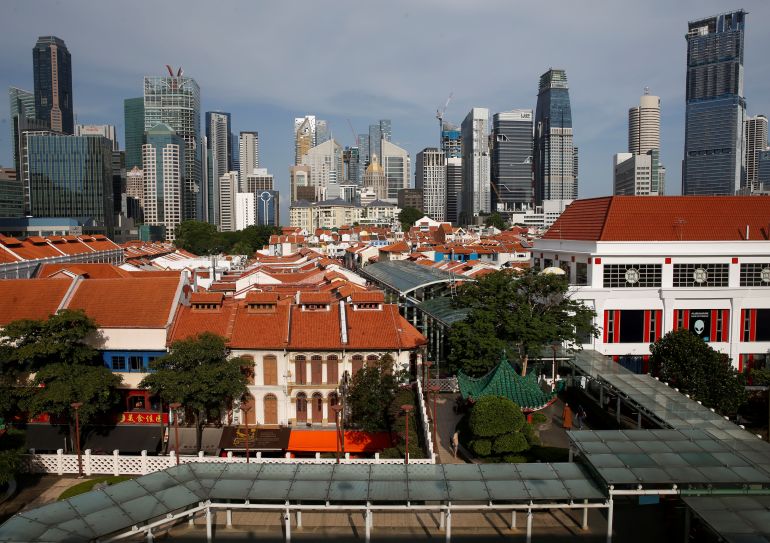 Singapore is known for its business-friendly environment (Aljazeera)
Singapore is known for its business-friendly environment (Aljazeera)
While the migration changes are set to raise the cost of doing business, Singapore’s advantages, including a business-friendly environment, its strategic location and world-class infrastructure, will continue to attract international companies, analysts said.
Singapore is expected to remain “the preferred choice” for firms’ regional headquarters, said Cielo’s Suhas, even if deploying smaller teams becomes more common due to the higher costs.
Suhas said the changes would also accelerate the various government initiatives aimed at creating high-quality jobs for locals, including early talent programmes and re-skilling programmes for mid-to-late career professionals.
“As a result, we anticipate that global companies setting up in Singapore will increasingly prioritise hiring Singaporeans,” he said.
Singapore ranks second in the 2023 World Economic Forum’s Global Talent Competitiveness Index, behind Switzerland.
Nicholas Sim, an associate professor at SUSS’s business school, said that businesses seeking to establish a foothold in Asia are still likely to prioritise Singapore due to its “high-quality infrastructure, efficient and stable government and access to a high-calibre talent pool”.
Besides the EP scheme, there are other avenues for foreign talent to come to Singapore.
In 2023, the Manpower Ministry launched the Overseas Networks & Expertise Pass for “top talent” in business, arts and culture, sports, academia and research.
As of January, the ministry had approved nearly 4,200 applications for the pass.
“Going forward, it’s a clear sign that the Singapore government wants to bring high-calibre individuals into the Singapore workforce – and firms will need to deliberate more carefully about hiring top-tier foreign candidates who are skilled and can add to Singapore’s long-term competitiveness,” Yim said.
”All the more, MNCs will see Singapore as a place for the cream of the crop.”
(Aljazeera)
Business
Trump heads to Saudi Arabia eyeing more investment in US

With US President Donald Trump due to visit Gulf states this week, a key focus will be securing significant new investment for the US economy.
“President Trump wants the announcement [of more Gulf money for the US],” says economist Karen Young, a senior fellow at the Middle East Institute think tank.
“He wants to have a big poster in a meeting that describes where these investments might go. And some estimation of what they will do to the American economy in terms of job creation or his big push, of course, on domestic manufacturing.”
Trump is due to arrive in the Saudi capital, Riyadh, on Tuesday 13 May, to meet the country’s de facto leader Crown Prince Mohammed bin Salman.
Trump is then expected to attend a summit of Gulf leaders in the city on 14 May, before travelling to Qatar that same day, and then ending his three-day trip in the United Arab Emirates (UAE) on 15 May.
The economic importance of the region to Trump is highlighted by the fact that the visit to Saudi Arabia was due to be the first overseas trip of his second term in the White House. That was before the death of Pope Francis necessitated Trump attending his funeral in Rome towards the end of April.
Saudi Arabia was also the first country that Trump visited during his first term of office, going against the modern practise of US presidents to start with the UK, Canada or Mexico.
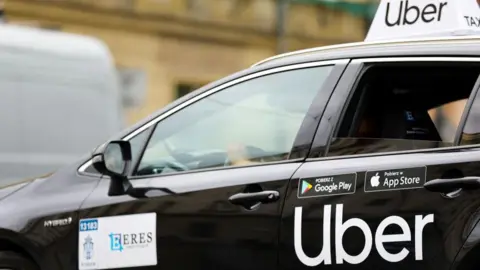
Securing new investments in the US from Gulf states, and particularly from their state-backed sovereign wealth funds, will help Trump to signal back home that his “America First” agenda is delivering results.
The presidential visit is drawing top Wall Street and Silicon Valley leaders to Saudi Arabia. A Saudi-US investment forum on 13 May in Riyadh will feature CEOs from BlackRock, Palantir, Citigroup, IBM, Qualcomm, Alphabet, and Franklin Templeton.
The push comes amid economic headwinds, as President Trump’s new import tariffs have significantly disrupted global trade, confidence, and the US economy itself. US economic output fell in the first three months of this year, its first fall in three years.
Back in January, Prince Mohammed said that Saudi Arabia would invest $600bn (£450bn) in the US over the next years. However, Trump has already said that he’d like that to rise to $ 1tn, including purchases of more US military equipment.
According to Ali Shihabi – a Saudi commentator and author, with close ties to the Saudi government – a number of economic agreements will be signed during the trip.
“These deals will further integrate the Saudi and US economies together, joint ventures in the kingdom, in the United States, procurements of American weapons and goods,” says Mr Shihabi.
Saudi Arabia’s sovereign wealth fund, the Public Investment fund (PIF), which controls assets worth $925bn, already has numerous investments in the US. These include Uber, gaming firm Electronic Arts, and electric car firm Lucid.
Meanwhile, the UAE has already committed to investing $1.4tn in the US over the next 10 years, in sectors such as AI, semiconductors, energy and manufacturing. This was announced by the White House in March after the UAE’s national security advisor, Sheikh Tahnoon bin Zayed Al Nahyan, met President Trump in Washington.
Yet Ms Young from the Middle East Institute says that the scale of these investments is not realistic in the short term. She instead says that they are long-term strategic moves, and that the figures should be taken “with a little bit of a grain of salt”.
Regarding specific deals that could be announced during Trump’s visit, it is widely reported that Saudi Arabia will agree to buy more than $100bn of US arms and other military items.
These are said to include missiles, radar systems and transport aircraft.
The US has been a longstanding arms supplier to Saudi Arabia, but in 2021 the then Biden administration stopped selling Riyadh offensive weapons, citing concerns about the country’s role in the war in neighbouring Yemen.
The 2018 killing of Saudi journalist Jamal Khashoggi was also widely reported to be a factor. A US report said that Prince Mohammed had approved the murder.
The Biden White House resumed the sale of these weapons last year. While it cited that the Saudis had stopped bombing Yemen, some commentators said that the US was seeking Saudi assistance to help end the conflict in Gaza and aid its future reconstruction.
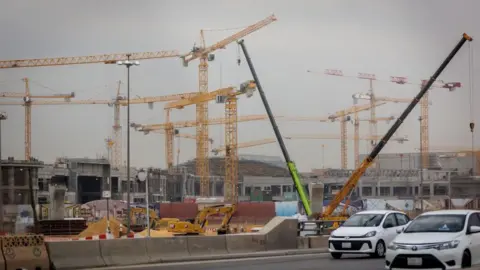
Mr Shihabi says Saudi Arabia will be seeking assurances from the White House that the US will implement a “more efficient procurement system”, enabling the Gulf state to access ammunition and military equipment far more quickly and easily.
“The Trump administration is initiating procedures to facilitate those deals. So, it’s expected that this process will improve immediately,” he adds.
Artificial intelligence is the other topic that will dominate the agenda during Mr Trump’s visit. Talks are expected to centre on attracting greater Gulf investment into US tech firms, and boosting the region’s access to cutting-edge American semiconductors.
The UAE and Saudi Arabia have been investing billions of dollars into tech and AI sectors as try to diversify their economies away from oil.
The Emiratis, in particular, are keen to establish themselves as a global AI hub.
Last week, the Trump administration scrapped the Biden-era chip regulations that placed restrictions on exports of advanced US chips to more than 120 countries including the Gulf states.
The White House is expected to draft new rules that would potentially involve direct negotiations with countries like the UAE.
“For the UAE, this is absolutely essential,” says Ms Young. “They are aggressively building out their AI capacity. So, for them getting access to US technology is imperative to be the best.”
While much attention will be on Trump courting Gulf capital for the US, Saudi Arabia is equally focused on drawing American investment into its ambitious Vision 2030 program.
Led by giant construction projects, such as the building of a linear city called The Line, Vision 2030 is central to the Saudi government’s continuing efforts to diversify the country’s economy away from oil.
It also involves pouring resources into entertainment, tourism, mining and sports.
However, foreign direct investment into Saudi Arabia declined for a third straight year in 2024, reflecting persistent challenges in attracting overseas capital.
The fall in global oil prices since the start of the year has further strained Riyadh’s finances, increasing pressure to either raise debt or cut spending to sustain its development goals.
Oil prices tumbled to a four-year low amid growing concerns that a trade war could dampen global economic growth.
The decline was further fuelled by the group of oil producing nations, Opec+, announcing plans to increase output.
Saudi Arabia is part of that group, and some commentators said that the rise was in part a desire to please Trump who has called for lower oil prices.
Other analysts said the reason was more that Opec+ remains confident that the global economy is growing.
The US-Saudi Business Council, is an organisation that aims to boost trade ties between the two countries.
It is hoping that Trump’s visit will push American businesses to explore more opportunities in Saudi Arabia, especially in sectors like AI, healthcare and education.
“The Saudi government is looking heavily to invest in these sectors. There is a very big appetite for Saudi companies to collaborate with American companies,” Hutham Al Jalal, who heads the Riyadh office for the organisation, tells the BBC.
Saudi officials are said to be confident that some deals in these sectors will be secured during Trump’s visit.
For Saudi Arabia, Trump’s visit is about strengthening ties with their longest-standing Western ally – a relationship that grew strained during the Biden years. For President Trump, it is about landing investment deals that can be framed as a win for his economic agenda.
“President Trump is looking for a headline of big investments in America, and he will get that from this trip,” adds Mr Shihabi.
[BBC]
Features
‘Proud to be young’ – Beauty queen, lawyer and Botswana’s youngest cabinet minister

Lesego Chombo‘s enthusiasm for life is as infectious as her achievements are impressive: she has won the Miss Botswana 2022 and Miss World Africa 2024 crowns, is a working lawyer, has set up her own charitable foundation – and made history in November, becoming Botswana’s youngest cabinet minister.
She was just 26 years old at the time – and had clearly impressed Botswana’s incoming President Duma Boko, whose Umbrella for Democratic Change (UDC) had just won a landslide, ousting the party that had governed for 58 years.
It was a seismic shift in the politics of the diamond-rich southern African nation – and Boko, a 55-year-old Harvard-trained lawyer, hit the ground running.
His main focus, he said, was fixing an economy too reliant on diamonds, telling the BBC ahead of his innauguration that he wanted young people to be the solution – “to become entrepreneurs, employ themselves and employ others”.
Key to this was finding a suitable ambassador – and Chombo was clearly it: a young woman already committed to various causes.
He made her minister of youth and gender.
“I’ve never been more proud to be young,” she told the BBC at the ministry’s headquarters in the capital, Gaborone.
“I’m a young person living in Botswana, passionate about youth development, gender equality, but also so passionate about the development of children.”
The beauty queen did not campaign to be an MP – she is what is called a specially elected member of parliament – and is now one of just six female MPs in the 69-member National Assembly.
Chombo said becoming an MP and then minister came as a complete surprise to her.
“I got appointed by a president who had never met me,” she said.
“Miss World and the journey that I thought I was supposed to pursue as my final destination was only the platform through which I would be seen for this very role.”
It was her crowning as Miss Botswana in 2022 that raised her profile and enabled her to campaign for social change, while trying to inspire other young women.
It also gave her the opportunity to set up the Lesego Chombo Foundation, which focuses on supporting disadvantaged youngsters and their parents in rural areas – and which she is still involved with, its projects funded by corporate companies and others.
“We strive to have a world where we feel seen and heard and represented. I’m very thrilled that I happen to be the very essence of that representation,” she said.
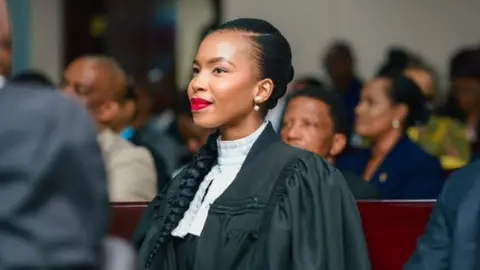
As she prepared for last year’s Miss World pageant, she said: “I really put myself in the zone of service. I really channelled it for this big crown.”
Now in political office, she is aware of the expectations placed on her in a country where approximately 60% of the population is below 35 years.
It also has a high level of unemployment – 28%, which is even higher for young people and women who have limited economic opportunities and battle systemic corruption.
Chombo said this was something she was determined to change: “Currently in Botswana, the rates of unemployment are so high.
“But it’s not just the rate of unemployment, it’s also just the sphere of youth development.
“It’s lacking, and so my desire is to create an ecosystem, an environment, a society, an economy in which youth can thrive.”
Chombo said her plan was to develop a comprehensive system that nurtured youth-led initiatives, strengthened entrepreneurship and ensured young people had a seat at the table when decisions were being made.
With Botswana’s anti-corruption policy undergoing a rigorous review, she said this would ensure that quotas for young entrepreneurs – when state departments and agencies put out tenders for goods and services – were actually reached.
The government has begun a 10-month forensic audit of government spending that will include 30 state-owned enterprises.
Indeed President Boko is intent on cracking down on corruption, seeing this as a way to bolter investor confidence and diversify the economy – something his deputy has been seeking to do on recent trips to the United Arab Emirates (UAE) and Switzerland.
And a key deal has now been secured with UAE-based CCI Global, a provider of business process outsourcing, to open a hub in Botswana.
While youth development is a central pillar of her work, gender equity also remains close to her heart.
Her short time in office has coincided with a growing outcry over gender-based violence.
According to a United Nations Population Fund (UNFPA) report, over 67% of women in Botswana have experienced abuse, more than double the global average.
“It hurts to know that it could be me next,” she admitted.
A month into her appointment, she was criticised for voting against an opposition motion in parliament to create “peace desks” at police stations and magistrate courts to quickly deal with victims.
At the time she said such provisions already existed within the law and what was needed was more public awareness.
This was followed in January by a police report noting that at least 100 women had been raped and another 10 murdered during the festive season – this caused public outrage with many lashing out at her on social media over the issue.
The minister reiterated – on several occasions, including before parliament in March – that Botswana had many laws and strategies in place and what was important was to ensure these they were actually applied.
But she told the BBC the government would be pushing for the implementation of a Gender-Based Violence Act, aimed at closing legal loopholes that have long hindered justice for survivors.
She said she was also advocating a more holistic approach, involving the ministries of health, education and local government.
“We want curriculums that promote gender equity from a young age,” Chombo said.
“We want to teach children what gender-based violence is and how to prevent it.
“It will boil down to inclusion of teaching gender equity at home, how parents behave around their children, how they model good behaviour.”

She has also been vocal about the need to address issues affecting men, particularly around mental health and positive masculinity, encouraging chiefs “to ensure that our patriarchal culture is not actively perpetuating gender violence”.
“I hear a lot of people say: ‘Why do you speak of women more than men?’
“It’s because as it stands in society, women are mostly prejudiced [against].
“But when we speak of gender equality, we’re saying that it should be applied equally for everyone. But what we strive for is gender equity.”
Chombo, who studied law at the University of Botswana, said she was thankful to her mother and other strong women for inspiring her – saying that women had to work “10 times harder” to succeed.
“[My mother] has managed to create an environment for me to thrive. And growing up, I got to realise that it’s not an easy thing.
“As women, we face so many pressures: ‘A woman cannot do this. A woman can’t do that. A woman can’t be young and in leadership.’ I’m currently facing that.”
She also credited Julia Morley, the CEO of Miss World, for helping her: “She has managed to create a legacy of what we call beauty with a purpose for so many young girls across the world.
“She has just inspired us so deeply to take up social responsibility.”
Chombo is serious about this. The beauty queen-cum-lawyer-cum-minister knows she has made history – but is also aware that her real work has only just begun.
“Impact. Tangible impact. That’s what success would look like to me,” she said.
“I want to look back and see that it is there and it is sustainable. That when I leave, someone else is able to carry it through.”
[BBC]
Foreign News
Pope Leo prays at tomb of Francis ahead of first Sunday address

Pope Leo XIV will give his first Sunday blessing and address to a crowd in St Peter’s Square in the Vatican today.
He will recite the Regina Caeli prayer, in honour of the Virgin Mary, in his first public address since his election was announced with white smoke on Thursday.
After delivering Sunday mass, Pope Leo will bless those gathered on the square outside – and deliver his reflections.
On Saturday, he visited a shrine outside Rome and then prayed before the tomb of his late predecessor Francis inside the basilica of Santa Maria Maggiore.
Pope Leo will be formally inaugurated at a mass in St Peter’s Square next week on 18 May.
[BBC]
-

 Latest News6 days ago
Latest News6 days agoNPP win Maharagama Urban Council
-

 Features3 days ago
Features3 days agoSAITM Graduates Overcome Adversity, Excel Despite Challenges
-

 Business6 days ago
Business6 days agoJohn Keells Properties and MullenLowe unveil “Minutes Away”
-

 Sports3 days ago
Sports3 days agoASBC Asian U22 and Youth Boxing Championships from Monday
-

 News3 days ago
News3 days agoDestined to be pope:Brother says Leo XIV always wanted to be a priest
-

 Foreign News4 days ago
Foreign News4 days agoMexico sues Google over ‘Gulf of America’ name change
-

 Opinion6 days ago
Opinion6 days agoRatmalana: An international airport without modern navigational and landing aids
-

 Opinion3 days ago
Opinion3 days agoDrs. Navaratnam’s consultation fee three rupees NOT Rs. 300





